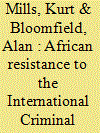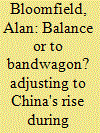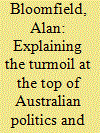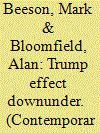|
|
|
Sort Order |
|
|
|
Items / Page
|
|
|
|
|
|
|
| Srl | Item |
| 1 |
ID:
157728


|
|
|
|
|
| Summary/Abstract |
The creation of the International Criminal Court (ICC) in 1998 marked a substantial advance in the effort to ensure all perpetrators of mass atrocities can be brought to justice. Yet significant resistance to the anti-impunity norm, and the ICC as the implementing institution, has arisen in Africa. The ICC has primarily operated in Africa, and since it sought to indict the sitting Sudanese President Omar al-Bashir in 2008 resistance from both individual African states and the African Union has increased substantially. We draw on the concept of ‘norm antipreneurs’, and the broader norm dynamics literature, to analyse how resistance has developed and manifested itself, as well as the potential effects of this resistance on the anti-impunity norm. We conclude that the antipreneur concept helped us structure and organise analysis of the case – suggesting it could be usefully deployed in other similar cases – but that this case also suggests that antipreneurs do not always enjoy substantial defensive advantages. We also conclude that African resistance to the ICC has substantially stalled the advance of the anti-impunity norm, a finding that has significant implications for the wider effort to reduce mass atrocity crimes in the contemporary era.
|
|
|
|
|
|
|
|
|
|
|
|
|
|
|
|
| 2 |
ID:
144533


|
|
|
|
|
| Summary/Abstract |
This article examines Australian grand strategy in the context of China's rise during the period of Labor governments between 2007 and 2013. Australia's grand-strategic posture is treated as the dependent variable, plotted along a balancing-to-bandwagoning continuum. Australia remained within the hedging zone throughout, although there were discernible shifts in posture during the period. While momentum was building towards a more overt balancing posture during the Kevin Rudd era, the various balancing and bandwagoning ‘signals’ were more contradictory after Julia Gillard unseated Rudd 2010; in short, she stabilised Australia's grand-strategic posture, meaning it remains best characterized as ‘dominance denial’.
|
|
|
|
|
|
|
|
|
|
|
|
|
|
|
|
| 3 |
ID:
148498


|
|
|
|
|
| Summary/Abstract |
Five Australian prime ministers have come and gone in the past five years. The turbulence at the top, however, is likely over because Malcolm Turnbull, the leader of the conservative Liberal Party, is likely to remain in the prime minister’s office for several years. This article first provides some background to the Australian political system before explaining why so prime ministers came and went between 2010 and 2015. It then considers the implications of all this for Australian foreign policy. The argument is simple: despite the constant personnel changes at the pinnacle of power there are actually few ‘deep’ differences between the two parties – or their leaders – in the realm of foreign policy. There are some differences, of course, so the final section considers the potential for changes in several policy-areas – climate change, national security, trade policy and asylum seekers – but any potential changes are judged likely to be minor and incremental. The article then finishes with consideration of what all of this means for India and, again, the conclusion is simple; it is likely to be ‘business as usual’ as Canberra tries to steadily improve the bilateral relationship in both security and economic terms.
|
|
|
|
|
|
|
|
|
|
|
|
|
|
|
|
| 4 |
ID:
136874


|
|
|
|
|
| Summary/Abstract |
India sat on the Security Council in 2011 when Resolution 1973 passed. This authorized NATO's intervention in the humanitarian crisis in Libya, which ultimately precipitated regime change. India's engagement with the crisis is analysed here with reference to various ‘identity-discourses’, treated as ‘shapers’ of India's specific policy-responses to the Libya crisis. This study finds that India flirted with the responsibility to protect (R2P) norm by abstaining when the Council voted on Resolution 1973; New Delhi effectively declined to oppose measures to resolve the crisis which were broadly consistent with Pillar III of R2P (that is, the responsibility of the international community to protect threatened persons). But after reflecting on NATO's intervention, Indian leaders largely retreated to their traditional preference for relatively strong interpretations of the sovereignty norm, suggesting India's flirtation with R2P – or at least with Pillar III – was brief and unhappy. While this paper finds that ‘soft’ liberal-democratic logic is very firmly established – Indian elites are committed to liberal-democratic principles, at least at home – it seems likely to take some time before the ‘hard’ liberal-democratic logic which shapes Pillar III-consistent responses to humanitarian crises becomes influential in Indian policy-making circles. In other words, New Delhi is unlikely to become a wholehearted supporter of the R2P norm without profound changes to India's international identity, which in turn has negative implications for the wider effort to further entrench R2P, especially its controversial Pillar III.
|
|
|
|
|
|
|
|
|
|
|
|
|
|
|
|
| 5 |
ID:
179032


|
|
|
|
|
| Summary/Abstract |
Sino-Indian relations have seen many ups and downs since the late 1940s. This paper surveys the bilateral relationship by considering their border dispute, status-competition, and economic relations before it examines various geostrategic points of contention, including: relations with Pakistan and the United States; bilateral water disputes; China's Belt and Road Initiative; nuclear weapons policies; and maritime competition in the Indian Ocean. The Galwan Valley incident in June 2020 – which saw Indian and Chinese soldiers killing each other with improvised weapons – is treated as an inflection point; thereafter the bilateral relationship has deteriorated from what T.V. Paul called a ‘managed and enduring rivalry' in 2018 into a ‘serious and enduring rivalry’ now. This finding provides wider context for the papers which follow in this special edition; these consider whether Sino-Indian rivalry presents, on balance, more opportunities or greater challenges to the smaller states in the Indian Ocean region.
|
|
|
|
|
|
|
|
|
|
|
|
|
|
|
|
| 6 |
ID:
144059


|
|
|
|
|
| Summary/Abstract |
Norm dynamics studies typically accord a special status to norm entrepreneurs, actors who promote new global norms. But conceptually privileging these agents of change has meant the norm dynamics literature has become unbalanced and marred by case selection bias. Accordingly, an oppositional role – the ‘norm antipreneur’ – should be recognised to correct these problems. When the normative status quo in an issue-area is entrenched, a clear distinction can be drawn between the entrepreneurs and antipreneurs, because in these contexts the antipreneurs enjoy significant but under-appreciated tactical and strategic advantages. Recognising this enables the construction of a norm dynamics role-spectrum – a sort of ‘typology of roles’ – including ‘competitor entrepreneur’ and ‘creative resister’ in addition to the entrepreneur and antipreneur roles which actors might play in particular norm contestation contexts. Understanding these roles promises to improve analyses of the dynamic interactions between actors in particular norm contestation processes, thereby bringing greater overall balance to the norm dynamics literature.
|
|
|
|
|
|
|
|
|
|
|
|
|
|
|
|
| 7 |
ID:
116294


|
|
|
|
|
| Publication |
2012.
|
| Summary/Abstract |
Strategic-cultural studies continue to proliferate, but scholars still cannot agree on fundamental matters like what a strategic culture is and what it does. This article examines the debates about strategic culture at the philosophical level - especially the debate between Alistair Iain Johnston, who prefers a positivist approach, and Colin Gray, who champions interpretivism - and finds that most conceptual models suffer from one of two general problems (and some models exhibit both). Existing models tend to be stated in a manner which is too coherent, meaning they can't account for occasional strategic-behavioural inconsistencies, and/or they suggest too much continuity and cannot thereby adequately account for changes in strategic policy over time. Instead, a model is offered which treats a singular strategic culture as containing multiple co-existing strategic subcultures. These subcultures each present a different interpretation of a state's international social/cultural context - who a state's 'friends' and 'foes' are - which in turn affects how that state interprets the material variables - geography, relative power, technological change, etc. - relevant to strategic decision-making. These different paradigms compete in public discourse for influence over strategic decision-making. This synthesis solves both the 'too-coherent' and the 'too-much-continuity' problems.
|
|
|
|
|
|
|
|
|
|
|
|
|
|
|
|
| 8 |
ID:
079695


|
|
|
| 9 |
ID:
165130


|
|
|
|
|
| Summary/Abstract |
Donald Trump’s election precipitated a debate in Australia about the value of retaining close alliance ties with the United States. Similar dynamics are discernible in other U.S. allies as the negative impact of Trump administration policies becomes clearer. Yet despite this “Trump effect,” we argue Australia is unlikely to distance itself from the United States because at the core of Australia’s strategic culture is a very positive “cultural orientation” toward the United States that is highly institutionalized in treaties, formal bilateral ties, Track 2 diplomacy, and public opinion. Such institutionalized ties have powerful path dependent effects. Accordingly, we conclude that the Trump effect does not constitute a powerful enough “exogenous shock” to move Australia off its well-worn grand-strategic path. But this alliance relationship is marked by both high cultural affinity and high institutionalization: American policy-makers should seriously consider whether other U.S. allies can tolerate similar levels of “stress.”
|
|
|
|
|
|
|
|
|
|
|
|
|
|
|
|
| 10 |
ID:
179949


|
|
|
|
|
| Summary/Abstract |
Australia and Indonesia are two very different countries with little in common other than geography. Their distinctive histories, cultures and identities have meant that the bilateral relationship has often been difficult and characterized by frequent misunderstandings and uncertainty. As close neighbors, however, they have had little option other than to try to make the best of their historical circumstances. This paper analyses the different strategic cultures, policies and perspectives that have emerged in both countries. We argue that despite their differences, the current international order offers an opportunity for “middle powers” to play a more prominent role – if they can recognize their mutual interests and potential as members of a region of growing international importance.
|
|
|
|
|
|
|
|
|
|
|
|
|
|
|
|
| 11 |
ID:
159374


|
|
|
|
|
| Summary/Abstract |
This article examines whether New Delhi’s engagement with the ongoing conflict in Syria (and Iraq) demonstrates that India is leaving behind its traditionally cautious and risk-averse foreign policy stance and becoming a more proactive international actor. India has not engaged actively with and has not tried to wield substantial influence over the course of this conflict; instead, after a moderate burst of diplomatic activity in the second half of 2011 India has largely tried to avoid involvement. There are some indications that India is trying to become more proactive in its region, in trade diplomacy, and toward a rising China; yet, results sometimes fail to meet ambitions. Accordingly, the article concludes that, on balance, India’s foreign policy orientation has not yet changed significantly; it remains a cautious, reactive international actor unwilling to engage with and actively shape the outcome of crucial crises or conflicts.
|
|
|
|
|
|
|
|
|
|
|
|
|
|
|
|
|
|
|
|
|